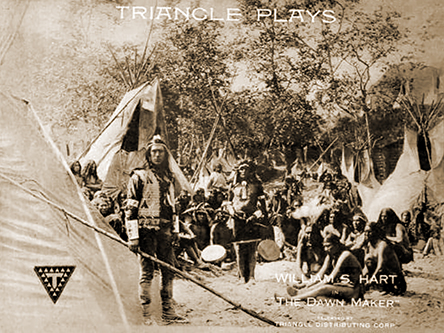| |
 |
| |
William S. Hart (foreground).
Photograph: Silent Era image collection.
|
The Dawn Maker
(1916) United States of America
B&W : Five reels
Directed by William S. Hart
Cast: William S. Hart [Joe Elk], Blanche White [Alice McRae], William Desmond [Bruce Smithson], J. Frank Burke [Walter McRae], Joe Goodboy [Chief Troubled Thunder]
Triangle Film Corporation production; distributed by Triangle Distributing Corporation [Kay-Bee]. / Scenario by C. Gardner Sullivan, from a screen story by C. Gardner Sullivan. Art direction by Robert Brunton. Cinematography by Joe August (Joseph H. August). / Released 24 September 1916. / Standard 35mm spherical 1.33:1 format. / The production was shot from 25 March through 28 April 1916, at a production cost of $11,352.18.
Drama: Western.
Synopsis: [?] [From The Moving Picture World]? Joe Elk was a half-breed Indian and greatly admired by Walter McRae, factor of the Big Otter Trading Station, the farthest north of the outflung posts of the Hudson Bay Fur Company. Joe Elk, despite his white blood, had been accepted by the Indian tribe of which his uncle, Troubled Thunder, was chief, and it was settled that upon the death of the uncle, Joe Elk would become chief. Joe Elk had a great longing to visit the cities of the white men and above all worshiped at the shrine of McRae’s daughter, Alice. She, unaware, of the feelings she inspired in the Indian, liked him impersonally, as did her father. Joe Elk visited Montreal with McRae, and when the factor, his daughter, and the Indian returned to the north, they were accompanied by Bruce Smithson, an acknowledged favored suitor for the girl’s hand. Joe Elk brought back with him a determination to erect schools and give the children of his tribe the advantages of the white men he had seen in Montreal. The ideals of Joe Elk were not received in any too friendly a spirit by the Indians, however, and he met with no assistance in his desire to erect his schoolhouse. Moreover, he learned that the feelings of the white girl for him were not the same as he held for her, but that, instead, it was Smithson who was the favored suitor for her hand. The unwillingness of his people to aid him in his desire to uplift them embittered Joe Elk, but encouraged by his white friends he stuck doggedly to his task and completed his schoolhouse. His determination to follow up the ideals of the whites, caused the tribe to cast him off. Then, he in turn, apprised by Alice McRae that he could never hope to win her, turned from the whites and sought to revert back to the ideals of the Indians. There came a blizzard. The Indians, shut off from their food supplies, robbed the storehouse of the company, leaving the factor, his daughter and Smithson without food. The protests of Joe Elk were unheeded and in the middle of the night, he was bound captive and forced to desert the outpost with the other Indians. A day's march away he was given his share of the stolen food and then offered the choice of accompanying the tribe or of returning to the whites. He chose the latter course. McRae, in attempting to protect the food, had been killed. The girl and Smithson faced death from starvation when Joe Elk suddenly appeared and took command of the situation. Followed many days of privation and untold suffering while the three walked many miles across the frozen lands of the north. Unknown to the others, Joe Elk saved his own meager food supply for them. When all three faced death, he forced his food on the man and the girl, sending them on, while he remained behind to meet his Maker. The girl and the man were saved and Joe Elk, though he died, was the Dawn Maker for his tribe, for the ideals for which he had really died were eventually carried out by the whites, whose devoted admirer he had been. • Additional synopsis available in Koszarski-Hart p. 51.
Survival status: (unknown)
Current rights holder: Public domain [USA].
Keywords: Native Americans
Listing updated: 16 November 2022.
References: Koszarski-Hart pp. xix, 51-52 : Website-IMDb.
|




































